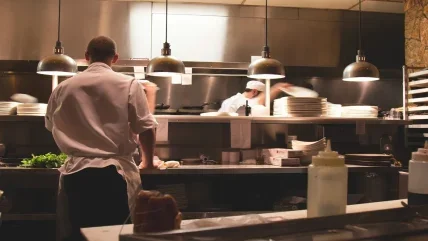
Resplendent in whites, celebrated chef and restaurateur, Daniel Boulud, 58, meets me at his eponymous bar at the Mandarin Oriental hotel in London’s Knightsbridge. He is on a whirlwind visit to promote his latest cookbook, which has taken two and a half years to complete. It is a 395-page, full-colour volume, with recipes and illustrations commemorating the 20th anniversary of Daniel, his three-Michelin-starred restaurant in Manhattan’s Upper East Side.
Boulud is quick to point out that Daniel: My French Cuisine (Sphere, £35) is not just a recipe book. “It reviews the time from when the restaurant opened right up to today,” he explains.
“There are essays about truffles, for example, as well as iconic recipes using Japanese, Middle Eastern, European and American ingredients from New York markets, all with a French style of cooking.”
The first part includes recipes from Daniel, such as soft shell crab tempura and lobster biryani masala. “I love French cuisine for its history, so the book is a reflection of the past and what I’ve learned from the chefs I’ve worked with, as well as those I haven’t, those who have been gone for a long time,” he says.
Another section, ‘Iconic Recipes’, is written by author Bill Buford, who worked with Boulud preparing a dozen French classic dishes from pot-au-feu to canard à la presse. “We spent a couple of weeks creating for the fun of cooking,” Boulud adds.
Home cooking
The chef lives on top of his flagship restaurant in New York. His office, known as “the skybox”, is a glass-enclosed den overlooking the kitchen. “As per the old French tradition, I still live above the store, so I included a section in the book on how I cook at home,” he says.
His empire is expanding with a Daniel Boulud Brasserie. A “white tablecloth casual dining” venue, it opened in Las Vegas in June in partnership with The Venetian, with which he also has a venture in Singapore.
A new bar and brasserie will open in Washington this year, as well as a Bar Boulud at the Mandarin Oriental hotel in Boston. “In New York, we own and operate all the restaurants as well as the catering business, Feast & Fêtes,” he says. “Outside New York, we work with partners including Mandarin, Ritz Carlton and Four Seasons.”
In America’s financial capital Boulud’s establishments range from Daniel, the three-Michelin-starred eatery, the one-star Café Boulud and Boulud Sud, a Mediterranean-themed restaurant, to Epicerie Boulud, an eat-in-and-take-out market and café with a charcuterie, boulangerie, and oyster bar. He talks enthusiastically about this concept and has plans to open more in the Big Apple. “It’s basically a food store that I enjoy,” he says. “We make pickled vegetables, bread. One of our specialities is the classic Vietnamese bánh mì bread: I’ve tasted some great ones, but ours is unique.
“We offer one-pot meals, such as chicken casseroles, that people can take home in order to enjoy a meal that they didn’t have to prepare, at the fraction of the cost of sitting in a restaurant.”
He is keen to encourage and nurture young people. Out of 800 employees in New York (including 200 chefs), more than half are aged around 25. Chefs under Boulud also have access to a database that holds the recipes and menus of all the restaurants, which they can use for inspiration, or as a basis for their own adaptations.
Apart from his culinary enterprises, the Frenchman was recently named co-president of Citymeals-on-Wheels. He has been working with the New York charity, which provides meals for elderly people, for a quarter of a century. He organises an annual fundraising gala in aid of the charity, but for the 20th anniversary of Daniel, Boulud was joined by 20 of his alumni, who cooked the gala meal with him. He plans to invite 50 chefs to lunch to discuss a new initiative under which, once per year, every cook will prepare 500 meals to be delivered to elderly people in selected neighbourhoods.
Boulud didn’t always want to be a chef. Brought up on a farm in France, his early ambition was to be a jockey.
“We had friends with racing horses, but that idea didn’t last long once I found out I’d have to get up at 4am to clean out the stables,” he laughs. “I wanted to quit school and start an apprenticeship. My family found me a job at Nandron restaurant, Lyon, so at 14, I left home.”
His first job entailed doing the basics, such as peeling vegetables and washing salads. “You do that for three months, after which you move into the kitchen,” he says. “After three and a half years, you are trained in every station and have gone through the seasonal cycle three times in a row.”
Coming to America
He worked under Paul Bocuse and was mentored by great chefs, including Roger Vergé, Michel Guérard and Georges Blanc. “The fraternity and passion was amazing,” recalls Boulud. “They were all reinventing French cuisine. While working in the south of France, I met American chefs and I wanted to discover America,” he says. “When I arrived in New York, I didn’t have enough money to open my own place. I had to work for ten years to prove myself. In New York, no matter where you come from, you can stay who you are.”
Quick Q&A
How do you relax?
I haven’t relaxed for several months because of the new cookbook and the book tour, but I’m going to the Caribbean to play golf, as my game is so bad.
What’s been your biggest challenge?
To offer customers a fair price while still making a profit. Food has increased in price tremendously and, rather than trying to find cheaper food and change my prices, I will continue to buy the same food at the higher cost, but not change the price on the menu. That’s a big challenge.
Are you doing any TV shows?
I am not doing any television series as the moment, but a movie, Final Recipe, is coming up, in which I play myself. It comes out in the autumn. It takes place in Shanghai over the course of a cooking competition between Asian young chefs. In my book, Letter to a Young Chef, I test young cooks by asking them to make an omelette, so in the movie they all had to make one in order to pass the first round.
What is your advice to young chefs?
Buy my book! You need to be disciplined and focused. Choose a mentor and take responsibility as a chef.
How important is the Michelin star system to you and why does it matter?
I think it matters. When a restaurant receives one star, should it try to achieve another, or settle for remaining a very good single-star place? Similarly, should a two-star restaurant aim for a third, or keep its two stars and serve the local community? Any restaurant that gets three stars will do so because it deserves them, but it won’t be so much about the community, or the people who helped it get there. Having three stars is a decision, because the restaurant becomes a global destination.
Daniel has held three Michelin stars for three years, but we are a New York restaurant first and foremost and we care about the people who have supported us for the past 20 years. It doesn’t matter where I go round the world, I always trust Michelin. When I travel to France, I take the red and the green Michelin guides: the latter for the sightseeing and the former for the food.
How much attention do you pay to food critics?
We take every criticism, good or bad, seriously. You have to maintain your standards; you might get a good review, but if you let standards drop, it won’t help. I have been in New York for 30 years cooking and I’ve seen a lot of critics. The better ones last.
A version of this article was first published in FCSI’s Foodservice Consultant www.foodserviceconsultant.org.






